Current Events
Understanding Prophecy and Preparing for the End Times
At Eden Outpost, we believe that understanding biblical prophecy is crucial for navigating the challenges of the last days and preparing for the imminent return of Jesus Christ. Our Prophecy & End Time Events page is dedicated to providing you with the insights and resources needed to comprehend and respond to these prophetic messages.
The Importance of Prophecy
Biblical prophecy serves as a divine roadmap, guiding believers through the complexities of the present and pointing towards future events. Jesus Himself emphasized the significance of prophecy, stating, “And this gospel of the kingdom shall be preached in all the world for a witness unto all nations; and then shall the end come” (Matthew 24:14). By studying prophecy, we can better understand God’s plans and prepare ourselves spiritually for what lies ahead.

Key Topics

Biblical Prophecy
Delve into the prophetic books of the Bible, such as Daniel and Revelation, to uncover God’s messages about the end times. Our resources help you interpret these prophecies in the context of current global events.

The Three Angels’ Messages
Learn about the critical messages found in Revelation 14:6-12, which call for worship of the Creator, warn against false worship, and proclaim the judgment hour. These messages are vital for understanding our role in the final events.

The Close of Probation
Understand the significance of the close of probation, a time when human destiny is sealed. This event marks the end of God’s grace period, emphasizing the urgency of repentance and faithful living.

Signs of the Times
Identify and understand the signs that indicate the nearness of Christ’s return. From natural disasters to moral decline, these signs are warnings for believers to remain vigilant and steadfast in their faith.

The Second Coming of Christ
Explore the promises and descriptions of Christ’s return as depicted in the Bible. Learn how to prepare yourself and your loved ones for this glorious event, ensuring that you stand ready when He appears.
Christian Nationalism
Christianity’s place in politics, and ‘Christian nationalism’ reported on 25/09/2024
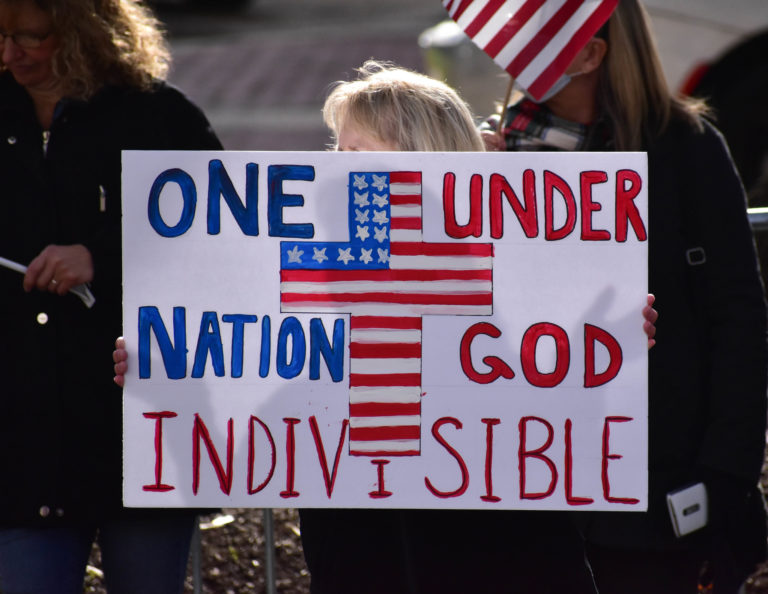
Prophecy has revealed that the whole world both Christian and Non Christian are uniting to be under one leadership which will lead the whole world into chaos that will lead to persecution. The Book of Revelation 13:3 states that ,”And I saw one of his heads as it were wounded to death; and his deadly wound was healed: and all the world wondered after the beast.”
Have you heard about the term Christian Nationalism. Its a term that has become so prominent with the current USA 2025 Election propagated by the Republicans. The term propagates the bringing of the church into the state.
In a recent study that was done it was found out that most Americans express support for the principle of separation of church and state. And few say they think the federal government should declare Christianity to be the official religion of the United States.
But many Americans do think that even though the U.S. shouldn’t officially be declared a Christian country, the federal government should promote Christian moral values. And half of U.S. adults say they think the Bible should have at least some influence in U.S. laws, including 28% who say that if the Bible conflicts with the will of the people, the Bible should have more sway.
Fewer than half of U.S. adults say they have ever heard or read anything about Christian nationalism, including 5% who say they have a favorable view of it and 25% who say they have an unfavorable view.
How much influence should the Bible have on U.S. laws?
U.S. adults are divided over the amount of influence the Bible should have on the country’s laws. About half of adults (49%) say the Bible should have “a great deal” (23%) or “some” influence (26%), while 51% say it should have “not much” or “none at all.”
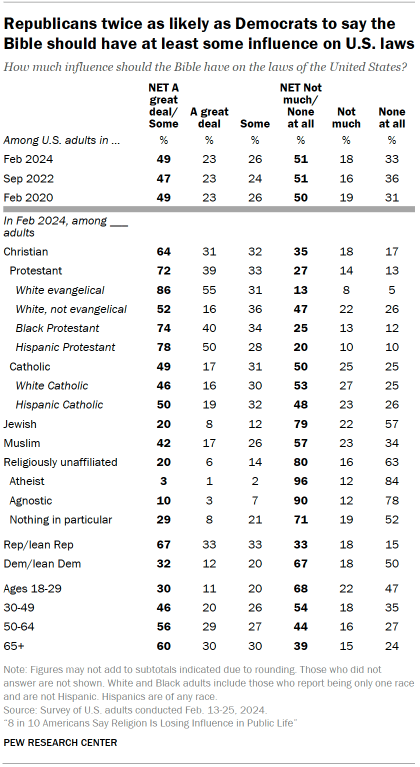
This is the third time we’ve asked this question in the last four years, and responses have remained fairly steady over that time.
White evangelical Protestants are more likely than adults in most other groups to say the Bible should have at least some influence on U.S. laws (86%) – including 55% who say the Bible should have “a great deal” of influence. A majority of Hispanic Protestants (78%) and Black Protestants (74%) also think the Bible should hold at least some influence on the country’s laws.
By contrast, 80% of religiously unaffiliated adults, 79% of Jews and 57% of Muslims say the Bible should not have influence on the laws of the United States. This includes 84% of atheists and 78% of agnostics who say the Bible should have no influence at all.
There also are large political divides on this topic. While 67% of Republicans and Republican leaners say the Bible should influence U.S. laws at least some, only 32% of Democrats and Democratic leaners share this opinion.
Younger adults and college graduates are less likely than other adults to say that the Bible should have at least some influence on U.S. laws.
What should happen when the Bible and the will of the people conflict?
Respondents who said the Bible should have at least some influence on U.S. laws were asked a follow-up question: When the Bible and the will of the people conflict with each other, which should have more influence?
Overall, 28% of U.S. adults say the Bible should have influence over U.S. laws and that it should take priority over the will of the people if the two conflict, while 19% say the Bible should have influence but that the will of the people should take precedence.
White evangelical Protestants and Hispanic Protestants are more likely than those in other religious groups to say the Bible should carry more weight in U.S. laws than the will of the people – 64% and 61%, respectively, say the Bible should have more influence on laws when the Bible and the will of the people conflict. And 49% of Black Protestants voice this opinion.
Among Catholics, 24% say the Bible should have more influence than the will of the people if the two conflict, 23% say the will of the people should take precedence over the Bible, and 50% say the Bible should have little or no influence on U.S. laws.
Republicans are much more likely than Democrats to say the Bible should have more influence than the will of the people when the two conflict (42% vs. 16%).
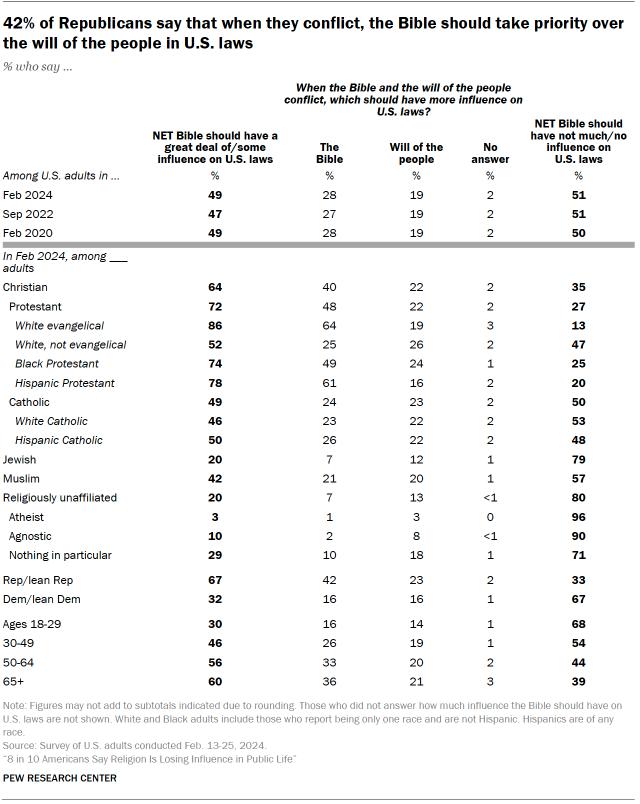
How much influence does the Bible have on U.S. laws today?
Distinct from their preferences on how much influence the Bible should have on U.S. laws, a majority of adults (57%) say they think the Bible currently does have at least some influence on this country’s laws.
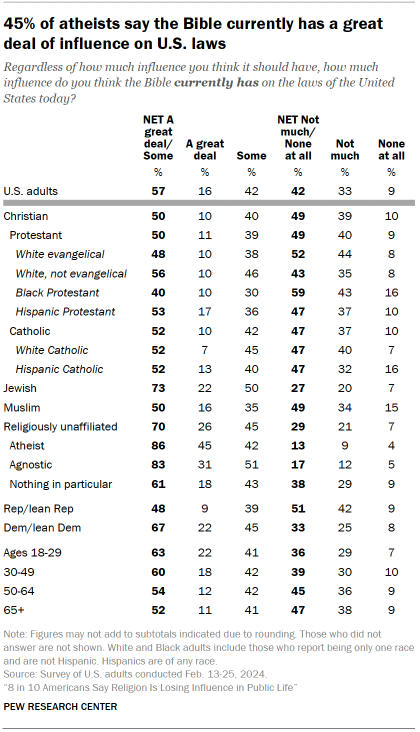
Atheists (86%) and agnostics (83%) are far more likely than people in other religious groups to say the Bible has influence on U.S. laws.
And 73% of Jewish respondents say the Bible has a great deal of or some influence over today’s laws.
Black Protestants are the only group in which a clear majority says the Bible does not currently have much influence on the country’s laws.
Democrats are significantly more likely than Republicans to think the Bible has at least some influence on today’s laws (67% vs. 48%).
Should the government stop enforcing church-state separation?
Just over half of Americans say the federal government should enforce the separation of church and state (55%) – virtually unchanged from when we asked this question three years ago.
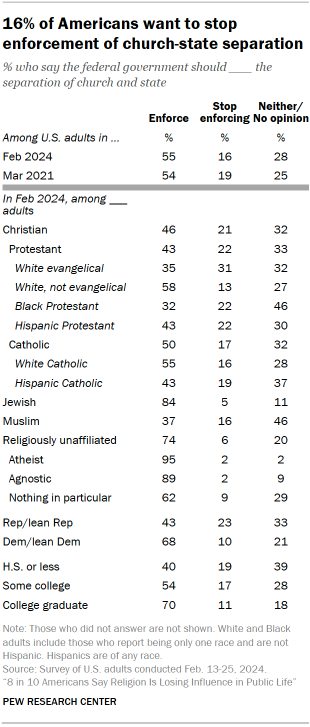
Meanwhile, 16% of U.S. adults say the government should stop enforcing church-state separation. And 28% of Americans say they have no opinion on this question or that neither option represents their views.
Almost all atheists (95%) say church-state separation should continue to be enforced by the federal government. Agnostics (89%) and Jews (84%) also are widely in favor of continued enforcement.
On the other hand, White evangelical Protestants are almost equally divided on this question: 35% say they favor federal enforcement of church-state separation, 31% say the government should stop enforcing this separation, and 32% choose neither of these options.
White evangelical Protestants are more likely than any of the other religious groups in this analysis to say the government should stop enforcing church-state separation.
Republicans are about twice as likely as Democrats to say the federal government should stop enforcing church-state separation (23% vs. 10%). But Republicans express more support for separation of church and state than opposition to it (43% vs. 23%).
Meanwhile, a clear majority of Democrats support the government enforcing the separation of church and state (68%).
Americans with a college degree are significantly more likely than other adults to say the federal government should enforce the separation of church and state.
Should the federal government declare Christianity the country’s official religion?
Survey respondents were asked to pick which of three statements best aligns with their views:
- The federal government should declare Christianity the official religion of the United States.
- The federal government should not declare Christianity the official religion of the United States, but it should promote Christian moral values.
- The federal government should not declare Christianity the official religion of the United States, and it should not promote Christian moral values.
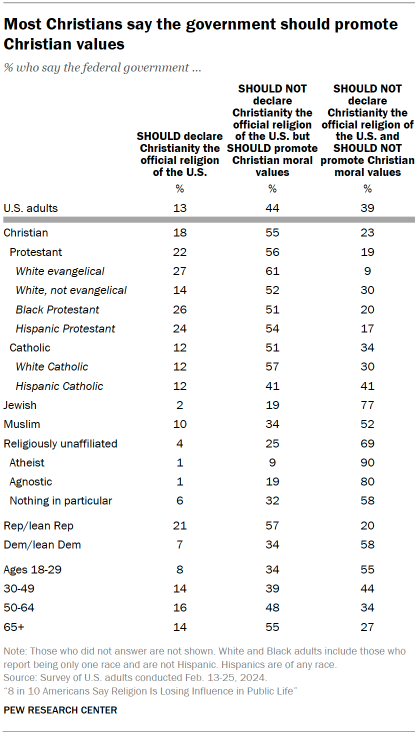
An overwhelming majority of Americans – 83% – say the government should not declare Christianity the official religion of the country. Only 13% of Americans support declaring Christianity as the national religion. (In our 2021 survey, a different question found a similar result on this topic.)
Another 44% of U.S. adults say the government should not declare the U.S. a Christian nation but should promote Christian values.
The remaining 39% do not want the government to promote Christian values or to declare a Christian nation.
A slim majority of Christians say they want the government to promote Christian values without declaring an official religion. In other religious groups, respondents most commonly say the government should neither declare a Christian nation nor promote Christian values. Atheists (90%) are particularly likely to fall in this camp.
While relatively few people say the federal government should declare Christianity the official religion of the U.S., this view is somewhat more common among White evangelical Protestants, Black Protestants and Hispanic Protestants. About a quarter in each group expresses this opinion.
Most Republicans (57%) say the federal government should promote Christian moral values but not declare the U.S. a Christian nation, while most Democrats (58%) say the government should not promote Christian values or declare the U.S a Christian nation.
Republicans also are more likely than Democrats to say Christianity should be declared the official national religion (21% vs. 7%).
Young adults are more likely than older adults to say that the government should neither declare Christianity the country’s official religion nor promote Christian moral values.
Do Americans know about ‘Christian nationalism’?
A slim majority of U.S. adults (54%) say they have heard or read “nothing at all” about “Christian nationalism” – the same share who said this when we asked this question two years ago.
Among the 45% who have heard anything about Christian nationalism, relatively few say they’ve heard “a great deal” (6%) or “quite a bit” (9%). More Americans say they’ve heard or read “some” (16%) or “a little” (14%) about Christian nationalism.
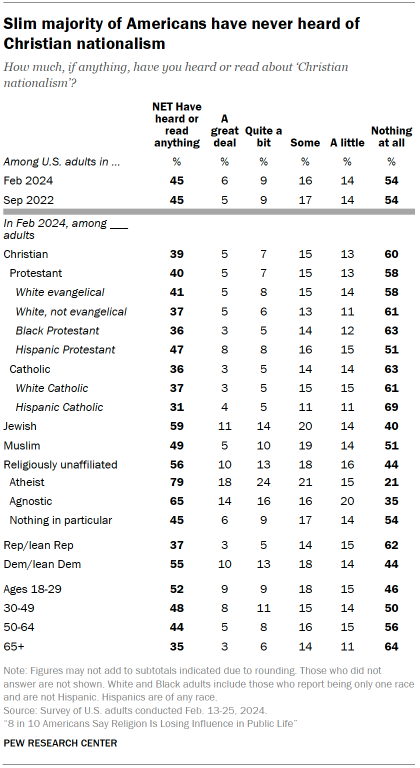
Most atheists, agnostics and Jews have heard at least a little about Christian nationalism. By contrast, 60% of Christians say they have heard or read nothing at all about it.
Views of Christian nationalism
Respondents who had heard or read anything about Christian nationalism were then asked a follow-up question: All in all, do you have a favorable or unfavorable view of Christian nationalism?
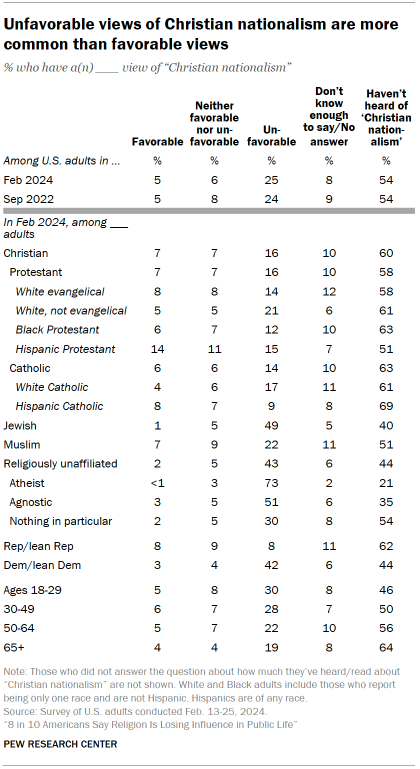
Overall, 25% of U.S. adults say they have heard of Christian nationalism and have an unfavorable view of it. Far fewer adults say they have a favorable view of Christian nationalism (5%).
There are no religious groups in which more people have a favorable than unfavorable view of Christian nationalism.
And some religious groups are particularly likely to hold an unfavorable view. For instance, 49% of Jewish respondents have an unfavorable view of Christian nationalism, while 1% say they have a favorable view.
Democrats are far more likely than Republicans to have heard about Christian nationalism and to have an unfavorable view of it. Most Republicans say they have never heard of Christian nationalism.

Attend Our Prophecy Seminars
Participate in our regular prophecy seminars where experienced speakers provide detailed explanations of biblical prophecies and their relevance to today’s world.

Join a Study Group
Connect with others who are passionate about prophecy and end-time events. Our study groups offer a supportive environment for learning and growing together.

Subscribe to Our Newsletter
Stay updated with the latest insights, articles, and events related to prophecy and end-time events. Our newsletter provides valuable information to keep you informed and prepared.
